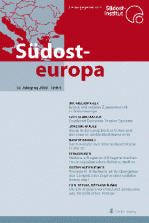

Southeast European Pension Systems and Three Types of Reform Unsustainability.
Guardiancich, I. (2008). Southeast European Pension Systems and Three Types of Reform Unsustainability. Südosteuropa. Zeitschrift für Politik und Gesellschaft, 56(4), 480-502.
Similar to other transition economies, Southeast European countries inherited from the socialist welfare systems their characteristic inefficiencies. Furthermore, in the context of severe labour market strains, the pension systems in Southeast Europe have been overstretched to the point of structural breakdown. Hence, the need for thorough restructuring arose. Under the aegis of the World Bank, part of the region (Bulgaria, Croatia, Kosovo, Macedonia, Romania) opted for variations of a new pension orthodoxy, which prescribes paradigmatic shifts to partial funding and to a stricter link between contributions and benefits. Slovenia steered from this course and only parametrically adjusted its public schemes. Albania, Bosnia-Herzegovina, Montenegro and Serbia are still picking a solution. Given an unenviable record of policy reversals, these countries should carefully observe their peers in order not to repeat analogous mistakes. In fact, experience shows us that even in the most developed parts of the region reforms can be fiscally, socially or politically unsustainable. To this end, the analysis of the implementation of new multipillar systems in Slovenia, Croatia, and also Hungary exemplifies the three unsustainability types and gives a stern warning against excessive radicalism to their more troubled neighbours.